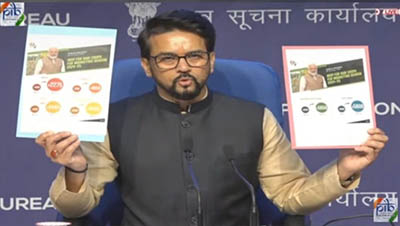New Delhi/Chandigarh/Shimla: Union Cabinet Committee meeting headed by Prime Minister Narendra Modi today, gave its green nod to set up a 7.5 GW Solar Park in Ladakh, as well as approved a Rs 20,773 Crore transmission project for power evacuation through Himachal and to Kaithal in Haryana. The Central Cabinet announced Hike on MSP for six major Rabi crops ranging from Rs 105 to Rs 200 per quintal.
The Modi government has targeted the farmers ahead of the coming Lok Sabha 2023 elections.
It has reaffirmed its commitment to 'double' their income, encouraging diversification of crops, making the country Atam-Nirbhar on oilseeds and other grains under the Millet and Palm seed Oil Missions.
Union Minister for IB and Youth Services and Sports, Anurag Singh Thakur, briefed the media on these decisions, emphasizing the government's commitment to both farmers and the region of Ladakh.
The Solar Park project, committed by Prime Minister Modi in 2020, is set to expand renewable energy capacity. A five-gigawatt transmission line will be built to connect Ladakh to the national grid at an approved cost of Rs 20,773 crore.
The 40% of the total cost will come from central grant and the rest will come from Power Grid Corporation.
This crucial infrastructure project is expected to be completed within the next three years and is likely to generate significant employment opportunities in the region.
Another significant decision focused on increasing the Minimum Support Price (MSP) for six different crops.
The MSP has been raised by varying amounts for oilseeds, mustard, wheat, Barlay, gram, and safflower, with the goal of boosting farmers' income and promoting self-reliance in crop production.
The Minimum Support Price (MSP) for oilseeds and mustard has been raised by an additional Rs 200 per quintal as recommended by the CACP. MSP for gram has seen an increase of Rs 115 per quintal, while the MSP for wheat raised by Rs 150 per quintal, Rs 115 per quintal for Barlay, Rs 105 per and Rs 150 per quintal for safflower by the Central Cabinet.
One of the most remarkable increases is observed in the Rapeseed and Mustard market, where MSP has soared to ₹5650, up from the previous ₹3000.
Similarly, another notable change has occurred in the price of wheat, where the MSP has surged from ₹1400 to ₹2275.
These hikes are making stakeholders take a closer look at how these changes will impact the cost of production for farmers.
India Achieves Record Crop Production, Progress Towards Self-Reliance in Agriculture
In a post-Covid scenario, India is witnessing a surge in the production of essential agricultural commodities, including millets, coarse grains, pulses, and oilseeds.
This rise in production is not only boosting farmers' income but is also driving the country towards self-reliance in agriculture and reducing dependency on imports.
Anurag Thakur said over the last eight years, India has experienced a remarkable increase in crop yield, with production soaring from 251.54 million tonnes to an impressive 330.54 million tonnes, marking a substantial 31% growth.
This positive trend has had a profound impact on India's agricultural landscape.
Despite this substantial growth, the country has been compelled to import certain agricultural goods.
To counter this challenge, a strong emphasis has been placed on crop diversification, a strategy that is consistently proving to be a success.
One notable example of this success can be seen in the Ladakh region. This region, with its unique climatic conditions and terrain, has emerged as a fertile ground for crop diversification.
The government's proactive initiatives, including the promotion of millets and other coarse grains, have yielded remarkable results.
The surge in crop production, along with the push for crop diversification, not only ensures food security for the nation but also brings India closer to self-reliance in agriculture.
With an increasing focus on domestic production, India is making strides toward reducing its reliance on foreign imports and securing a stronger and more self-sustained agricultural future, Thakur said.
As the nation grapples with these changes in MSP, the impact on farmers and the broader agricultural sector remains a central concern.
The government's role in managing these increases and supporting the agricultural community will likely be under scrutiny in the coming days.
Additionally, a bonus equivalent to 78 days of salary has been approved for non-state railway employees as Dussehra approaches.
This move is intended to benefit over 11 lakh railway workers, Thakur said.
These decisions aim to support renewable energy expansion, enhance the livelihoods of farmers, and provide bonuses to railway employees during the festive season.
The government remains committed to its goals of agricultural growth and sustainable energy development, Thakur said.








